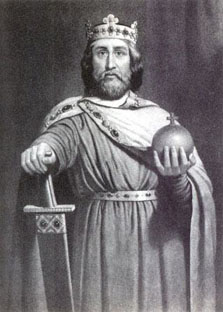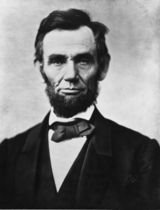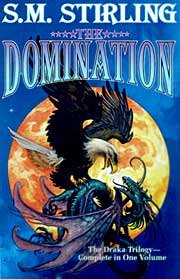| Carolus Magnus | "Let peace, concord and unanimity reign among all Christian people .. for without peace we cannot please God." |
 | |
| Frankish insurgent |
| Carlous Magnus (Charlemagne) was the architect of the European idea, yet unable to establish control over his native territories of the Franks and the Lombards. The set backs at the Battles of Toulouse (721) and Tours (732) had gifted the keys of south-west France into the hands of the Governors of Al-Andalus. Umayyad control spread inexorably westward from Narbonne into Aquitaine. A synopsis of the Frankish insurgency is provided at Wikipedia |
| Martin Luther | "Hier stehe ich. Ich kann nicht anders. Gott helfe mir. Amen (Here I stand. I can do no other. God help me. Amen.)" ~ Martin Luther addressing the Diet of Worms, 1521 ~ Martin Luther addressing the Diet of Worms, 1521 |
 | |
| Heretic |
| Before being sentenced to death by Emperor Charles V for heresy following the Imperial Diet. Emperor Charles V opened the imperial Diet of Worms on January 22, 1521. Luther was summoned to renounce or reaffirm his views. When he appeared before the assembly on April 16, Johann Eck, an assistant of the Archbishop of Trier , acted as spokesman for the emperor. He presented Luther with a table filled with copies of his writings. Eck asked Luther if the books were his and if he still believed what these works taught. Luther requested time to consider his answer. It was granted. Luther prayed, consulted with friends and mediators and presented himself before the Diet the next day. When the counselor put the same questions to Luther, he said: "They are all mine, but as for the second question, they are not all of one sort." Luther went on to categorize the writings into three categories: The first category was of works which were well received by even his enemies. These he would not reject. The second category of his books attacked the abuses, lies and desolation of the Christian world. These, Luther believed, could not safely be rejected without encouraging abuses to continue. The third and final group contained attacks on individuals. He apologized for the harsh tone of these writings, but did not reject the substance of what he taught in them. If he could be shown from the Scriptures that he was in error, Luther continued, he would reject them. Counsellor Eck, after countering that Luther had no right to teach contrary to the Church through the ages, asked Luther to plainly answer the question: "Would Luther reject his books and the errors they contain?" Luther replied: "Unless I am convicted by Scripture and plain reason —I do not accept the authority of popes and councils, for they have contradicted each other— my conscience is captive to the Word of God. I cannot and will not recant anything, for to go against conscience is neither right nor safe." Prince Frederick III, Elector of Saxony, obtained an agreement that if Luther appeared he would be promised safe passage to and from the meeting. Such a guarantee was essential after the treatment of John Hus, who was tried and executed at the Council of Constance in 1415, despite a safe conduct pass. The edict was seen as a divisive move that distressed more moderate men, in particular Desiderius Erasmus who led a violent reformation that burned through Europe for two centuries. A synopsis of the Diet of Worms can be viewed at Wikipedia |
 Kunte Kinte | In 1976/1767, the young actor LeVar Burton dreams of a great river running into a bay. He sees a white state house flying the Maryland flag. African Americans in chains are prepared for a slave auction. Burton is distressed to see Alex Haley amongst them. The author looks at him in misery and says HELP ME. The young actor awakes, and packs his bags. He will must go to Annapolis and, if he can, set right this great wrong. |
| In 1978, a paperback version of What If Booth's Bullet Had Killed Lincoln? was published. In Fern Bryant Fadness dystopian world, the process in U.S. history known as Reconstruction goes awry. When both the Confederacy and slavery were destroyed, attempts to resolve the issues of the American Civil War are largely reversed by Lincoln's heirs. In this dramatic short story the Civil Rights movement is delayed by forty years to the 1960s, and Jesse Jackson never gains the White House. |  Lincoln |
 Dominion | In 1580, Sir Francis Drake circumnavigated the globe, establishing himself as the sixteenth century role model for the Draka, an aggressive militaristic slave-owning society. As described by historian S. M. Stirling, during the American Revolutionary War, the Netherlands declared war on Great Britain, resulting in the loss of its Cape Colony. After defeat in Revolutionary War, the Loyalists settled in the new Crown Colony of Drakia (later, the Dominion of Draka) in South Africa. |
| In 1907, New Zealand and Newfoundland each became an integrated part of metropolitan France within the French Union. The significance of the loss of these territories from France to Britain was revealed upon the surrender of France in 1940. Suddenly, both Australia and the United States had borders with satellite states of Vichy France, forcing those nations to make urgent engagement decisions. Had they not, Britain would have faced Hitler alone and thus the early loss of Colonies was in the famous words of Winston Churchill “a cloud with a silver lining”. |  Winston Churchill |
No comments:
Post a Comment